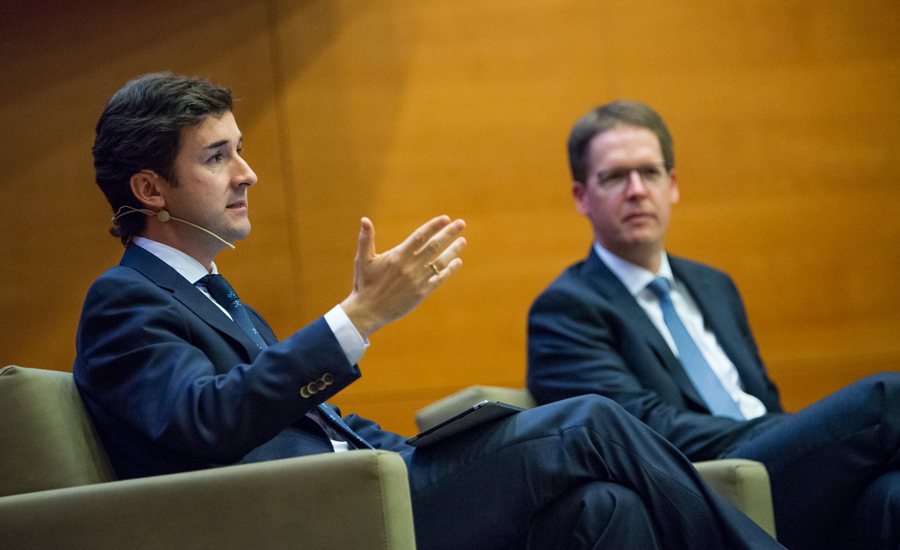
“Good leadership has always been important, but during a time of transformation it is a matter of survival,” asserts Ricardo Forcano. BBVA’s Global Head of Talent and Culture joined DeanFranz Heukamp to share his thoughts on the banking industry today, and the kind of leaders such a landscape demands.
“We’re now in the middle of a perfect storm,” says Forcano, who visited IESE’s Barcelona campus just four months into his new role, at a time when the prominent bank is preparing the next generation for a particularly challenging environment. He identified three factors responsible for this storm.
“Firstly we have negative interest rates in Europe and close to zero in the U.S., which poses a challenge for generating value,” he explains. “Then there’s growing regulatory pressure resulting in increased cost of larger teams that are required to deal with regulatory issues.”
“Thirdly,” says Forcano, “we are in the middle of a transformation process – consumers want access to services wherever and whenever they want, there’s new competition from the technology and start-up space, and we need to build capabilities to accommodate new tech.”
Tech Transformation
Within this context, BBVA continues its own transformation that began ten years ago, at the start of the financial crisis. “Our first phase was built around technology,” says Forcano, “our IT platform was like spaghetti and, without solving this, it’s difficult to do the rest.”
It was a basic operational requirement to update the back office, but the bank has also had to technologically adapt to keep pace with changing customer behavior. “Formerly their relationship with us was through the branch and customer service center. But we have now adapted to cells,” Forcano explains.
For example, this week BBVA became the first bank in Spain to enable customers to launch an account solely through their mobile – with the use of a selfie.
Cultural Shift
Renewing the bank’s IT platforms took five to six years but, with over 130,000 employees in over 30 countries, the more fundamental change of culture within the organization is an ongoing challenge – “this is what is going to constrain your capabilities to transform,” says Forcano.
Nevertheless, he observes that BBVA is a very different place to ten years ago. “Our processes were very hierarchical and based on organizational boxes and teams,” he explains, “but in the bank we have thousands of people working on many projects. People weren’t talking to each other – what was driving them was function and not outcome.”
BBVA reduced the size of the teams, and gave them full time dedication to their projects. “Now we are an organization that is flatter and more liquid,” says Forcano, “clarity on role and responsibility is more important than hierarchy now.”
In terms of cultural evolution at BBVA, the journey continues. Forcano remembers a quote from his CEO when he says: “the status quo was the value in the bank for many years, now it’s time to take it to the opposite. Now if someone is thinking about how to change the status quo, that is what’s valuable.”
Taking lessons from the start-ups in Silicon Valley that grew at such an unprecedented rate, Forcano asserts that “we want to make purpose the basis of everything we do. If achieved, it’s an amazing competitive advantage, because what could be more effective than all employees committed to one purpose?”
Tips for Leaders of Tomorrow
In the context of these seismic shifts within BBVA and the wider banking panorama, Forcano identifies five qualities that leaders should possess:
A genuine interest in continuous learning
Capacity to manage and adapt to continuous change
To have a real focus on having impact and adding value
To be closer to teams and employees in an authentic way by investing time in communication
Foster a real culture of continuous feedback
The Global Head of Talent and Culture focuses on three essential takeaways for MBAs:
- Build small cross-functional teams: historically we have overinvested in structure.
- Promote a process of continuous delivery versus project planning: check in with teams every two weeks, as opposed to waiting for the end result after two years, to raise the dynamic of focus and delivery.
- You need a vision and purpose versus a strategy: Of course a strategy is necessary, but you need to motivate and engage employees towards the same vision as the organization.